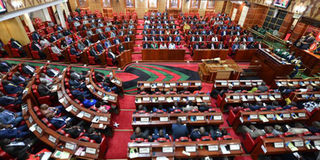Experts want State to freeze hiring of civil servants

The National Assembly in session. A proposal to freeze employment of civil servants in a bid to keep the budget in check is set for debate in Parliament. FILE PHOTO | NATION MEDIA GROUP
What you need to know:
They said employment should focus only on essential services like security, health and education.
The government spends nearly half of the money it collects as taxes on civil servants’ pay.
Another measure would be for the government to reduce its planned expenditure and only increase to allow for inflation, the report said.
A proposal to freeze employment of civil servants in a bid to keep the budget in check is set for debate in Parliament.
Parliament’s experts on economic policy and budgeting, who made the proposal, said this will make the budget manageable and realistic.
In a report prepared for MPs before the start of the budgeting cycle in Parliament, they said employment should focus only on essential services like security, health and education.
“The public wage bill has grown significantly over the past years; a freeze in employment and allowing natural attrition to take place will slow down the wage growth,” said the Parliamentary Budget Office (PBO).
REDUCE SPENDING
The experts said freezing employment will reduce government spending and ensure focus was on other activities that contributed to economic growth.
The government spends nearly half of the money it collects as taxes on civil servants’ pay, according to the Salaries and Remuneration Commission.
The amount has increased from Sh464.9 billion in 2012/13 financial year to Sh675.8 billion in the 2016/17 financial year.
The freeze was among measures proposed by the office to reduce the budget deficit – the difference between what the government plans to spend and what it realistically thinks it can get in the form of revenue.
INFLATION
Another measure would be for the government to reduce its planned expenditure and only increase to allow for inflation, the report said.
“The 2018/19 budget should not exceed Sh2.2 trillion – 2017/18 budget excluding one-off payments. All government expenditure must be reorganised to fit this plan,” said PBO, adding that if this was done, the government could save Sh200 billion.
In its draft Budget Policy Statement, the Treasury said it intended to spend Sh2 trillion in the coming financial year.
This would be shared out among the national government (Sh1.7 trillion), Parliament (Sh31.8 billion), Judiciary (Sh17.8 billion) and counties (Sh315.4 billion).
Overall, the government’s spending has been increasing at a faster rate than its revenue collection. Spending increased by an estimated 20 per cent over the last seven years but revenue has grown by only 13 per cent.
This has forced the government to resort to borrowing to fund expenditure, especially investment in capital projects such as infrastructure. Now, most of the development is funded by loans.
PLANNED EXPENDITURE
PBO, which works closely with the departmental as well as the Appropriation committees, also proposed the reduction in government spending or sticking to the planned expenditure.
“Consider fully costed, quantifiable, policy driven rationalisation measures that will reduce the budget by Sh32 billion,” it said.
Treasury should also stick to the approved borrowing plan as well as the set limits, said the experts.
They also recommended that the government concentrate on finishing ongoing projects before embarking on new ones.
“In addition, the budget estimates should be accompanied by a detailed report on completed, ongoing and future projects,” said the experts.
PBO said in 2016 there were more than 1,000 pending projects at the time that would cost a cumulative Sh3 trillion to complete.
The office also indicated its concern at debt guarantees by the government to State-owned enterprises.
That debt is currently at Sh135.8 billion, just Sh64 billion short of the Sh200 billion threshold.
PBO said the risk on these kind of debts was that should the parastatals default, the debt would have to be paid by the national government, adding to an already significant burden.





